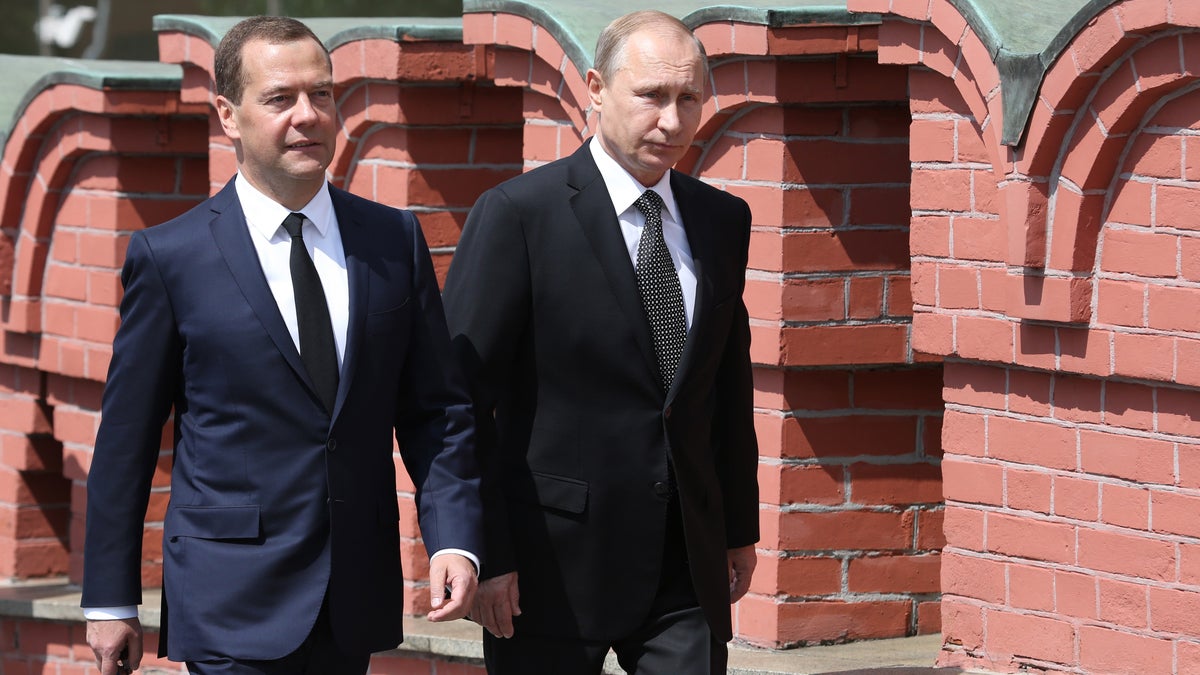EU extends sanctions against Russia by 6 months
{{#rendered}} {{/rendered}}
June 22, 2015 - Russian President Vladimir Putin, right, and Premier Dmitry Medvedev, walk along Moscow's Kremlin wall to take part in a wreath laying ceremony at the Tomb of the Unknown Soldier, marking the 74th anniversary of the Nazi invasion of the Soviet Union. (AP)
The European Union on Monday extended economic sanctions against Russia until January to keep pressure on Moscow over the conflict in eastern Ukraine, drawing a rebuke and a warning of retaliation from Russian officials.
An EU statement said the decision was taken without debate by the bloc's foreign ministers at a meeting in Luxembourg, in response to "Russia's destabilizing role in eastern Ukraine."
The sanctions, along with U.S. and other Western measures against Russia, have contributed to a softening of the Russian economy at a time when the price of oil that is crucial to its economic output also has fallen. The sanctions have also put a pinch on some of Russia's key EU trading partners.
{{#rendered}} {{/rendered}}The sanctions include limits to access on some financial markets, a ban on certain technologies and exchanges between the bloc and Russia in energy and defense sectors. Enacted last July and reinforced in September, the sanctions had been due to expire in July.
They are now expected to expire on Jan. 31.
In response, Russia is expected to extend its ban on the import of many agricultural products from the EU, which was imposed as a countermeasure to the EU sanctions.
{{#rendered}} {{/rendered}}"Since they were extended, we will act on the principle of reciprocity," said Dmitry Peskov, spokesman for Russian President Vladimir Putin.
Fighting between Ukrainian forces and Russian-backed rebels has killed more than 6,400 people in eastern Ukraine and persists despite a cease-fire agreed in Minsk, Belarus, in February that calls for the pullback of heavy weapons from the front line.
The Russian Foreign Ministry said in a statement Monday it was "deeply disappointed that once again in the EU, the view of the Russophobic lobby has prevailed" in the extension of the "illegal restrictions."
{{#rendered}} {{/rendered}}The ministry said it was wrong to hold Russia fully responsible for the implementation of the Ukraine peace agreement and that the key to a settlement was in Kiev's hands.
The ministry also said "it looks particularly cynical" that the EU made the decision on June 22, the date in 1941 when Nazi Germany invaded the Soviet Union. Russia still holds memorial services on this day.
"We would like to believe that this is a coincidence, not a specially designed step," the ministry statement said.
{{#rendered}} {{/rendered}}German Foreign Minister Frank-Walter Steinmeier said the extension of sanctions was already likely before Monday's gathering.
"In other words, all countries agreed," he told reporters during a break in the EU talks. "Because as long as the Minsk agreement is not fulfilled and also Russia has some responsibility for that, it was agreed that the measures would be extended."
NATO Secretary-General Jens Stoltenberg welcomed the EU's decision, and predicted that the array of punitive measures imposed by the West would "change the behavior of Moscow."
{{#rendered}} {{/rendered}}EU sanctions "are a strong signal and a clear message that it has consequences when a country behaves in the way Russia has done in Ukraine," he told a news conference in Brussels. He said Western sanctions were having a clear impact on Russia's economy.
